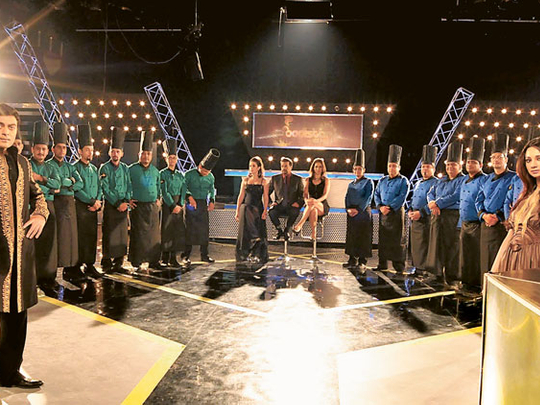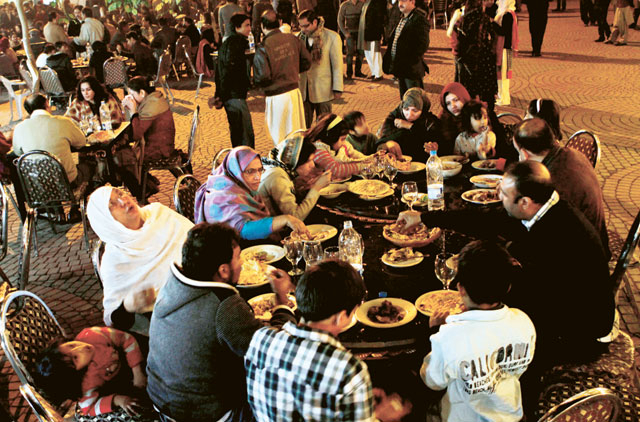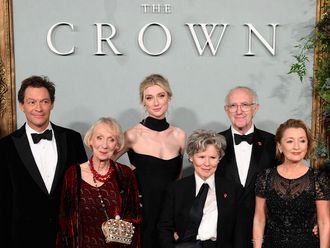
For decades, arch-enemies Pakistan and India have engaged in a dangerous nuclear arms race. Now they're also competing in a more cheerful forum. The outcome will be mouth-watering curries and soothing Sufi ballads, not violent conflict.
The fractious neighbours are going head-to-head in a pair of reality TV shows that pit chefs and musicians against each other. Producers hope the contests will help bridge the gulf between two nations that were born from the same womb and have been at each other's throats ever since.
But so far it hasn't completely worked out that way. The top Pakistani chef on the cooking show, which is called Foodistan, quit the contest early. He accused the judges of bias toward India and is threatening to sue. The producers denied the allegations.
Pakistan and India were founded in 1947 following the break-up of the British empire. They have fought three major wars, two of them over the disputed territory of Kashmir.
The TV shows do not try to hide or brush over this painful history. They make light of it.
"Now the world's greatest rivalry is going to get spicier," said co-host Ira Dubey during one of the early episodes of Foodistan, which first aired in India on January 23 and will be shown in Pakistan starting in mid-February.
Her counterpart, Aly Khan, said the aim of the two teams "would be to grind the opposition into chutney, to make them eat humble pie, to dice them, slice them and fry them on their way to culinary glory".
Overlap in cuisines
Eight chefs from each country were scheduled for individual and team competitions over 26 one-hour episodes, with the winner authoring the first Foodistan cookbook and receiving a trip to three cities of his or her choice anywhere in the world.
There is significant overlap in the cuisines of both countries, as there is in language, music and culture. Pakistanis and Indians both love curry, kebab and biryani — a spiced rice dish. But they often use different ingredients, and dishes can also vary from one region to another within the same country.
Pakistani dishes often include beef, which is not eaten by many people in majority Hindu India for religious reasons. India has more vegetarian dishes, and the food is often cooked with ingredients like coconut milk that are rarely found in Pakistan.
Many Pakistanis and Indians have missed out on enjoying the varied tastes of the other country because mutual enmity has made cross-border travel difficult.
"Even though they are neighbours, Indians don't know what Pakistani food is like and vice versa," said Mirza Fahad, a production assistant at India's NDTV, which developed Foodistan. "It was long overdue to get to know each other's foods."
During the first cook-off on the show, filmed in New Delhi, the judges gave four chefs from each side two hours to prepare a biryani, curry, kebab and dessert. Each of the three judges gave the team's meal a score out of 10.
The judges loved the Iranian-inspired fish biryani cooked by the Pakistanis, their chicken kebab stuffed with figs, olives, bread and mango chutney, and their shahi tukda — a dessert of fried bread soaked in hot milk with spices. They scored 21 out of a possible 30, losing points because a dish of chicken in shalimar curry was a tad chewy.
The Indians ended up winning the first contest by one point with a menu that included chicken tikka with truffle cream, cheese kofta in a tomato and water chestnut curry, lamb biryani and phirni — a sweet rice pudding that they topped with strawberry granita.
The captain of the Pakistani team, Mohammad Naeem, executive chef at the Park Plaza Hotel in Lahore, alleged the judges didn't have enough knowledge of Pakistani food and were destined from the beginning to pick an Indian to win.
The judges included a British chef, an Indian food critic and a Bollywood actress of Pakistani and French descent.
Another member of the team, Akhtar Rahman, a chef at the Marriott Hotel in Islamabad, said concerns about the judges were fairly widespread on the Pakistani side, but Naeem was the only one to quit.
It remains to be seen whether the music competition — Sur Kshetra, or Musical Battlefield — also will spark ill will.
The contest, which is being filmed in Dubai, is scheduled to air in Pakistan and India starting in mid-February, said Mohammad Zeeshan Khan, a general manager at Pakistan's Geo TV, which is developing the show.
"Music can unite people across borders and bring them closer together," said Khan.
The competition will include teams of six musicians from each country between the ages of 18 and 27. The teams will be mentored by two well-known pop singers and actors, Pakistani Atif Aslam and Indian Himesh Reshammiya. They will compete across a range of genres, including jazz, pop, rock and qawwali — traditional Sufi Muslim ballads that are popular in both countries, said Khan.
The grand prize is still being worked out, but Khan said the winner can claim to be "the new musical icon for the subcontinent".













